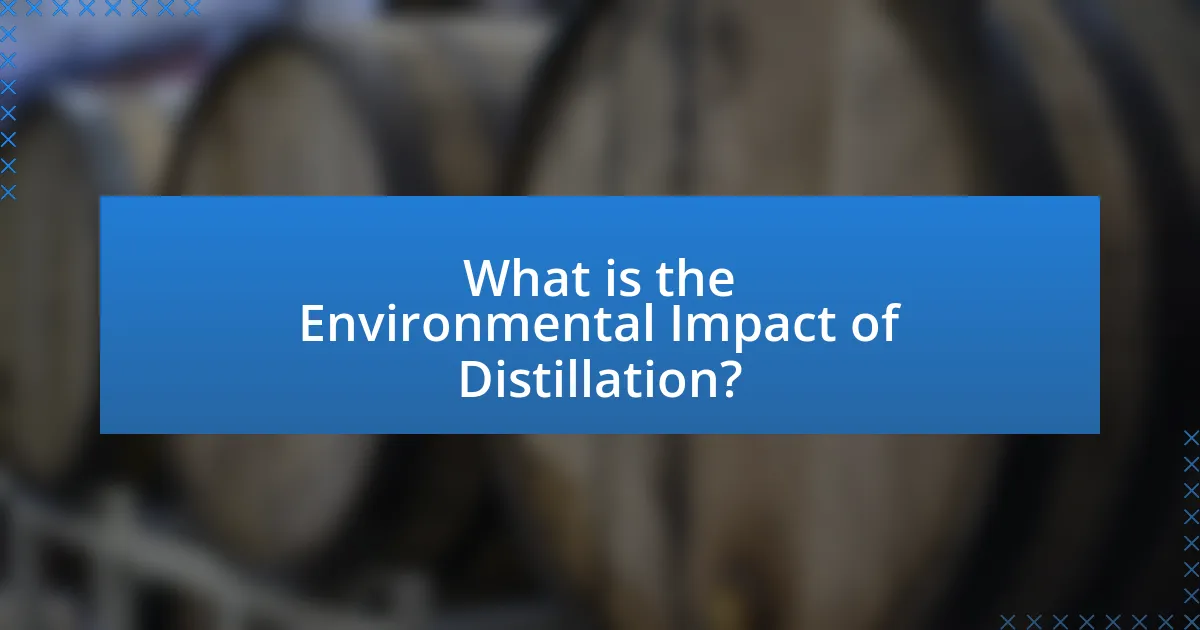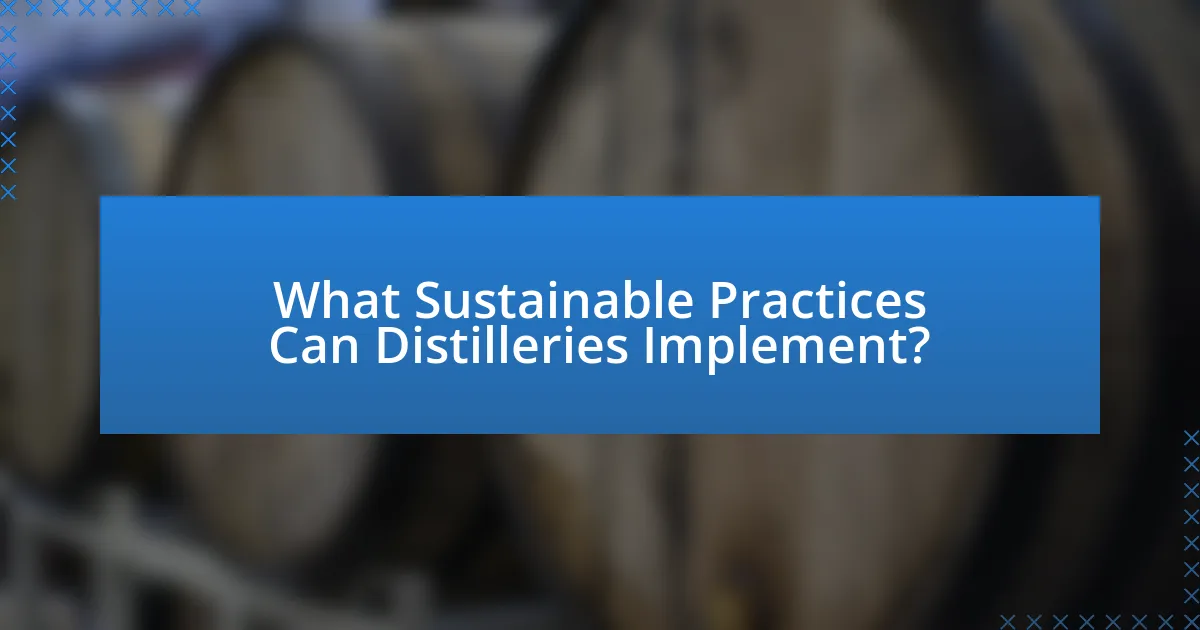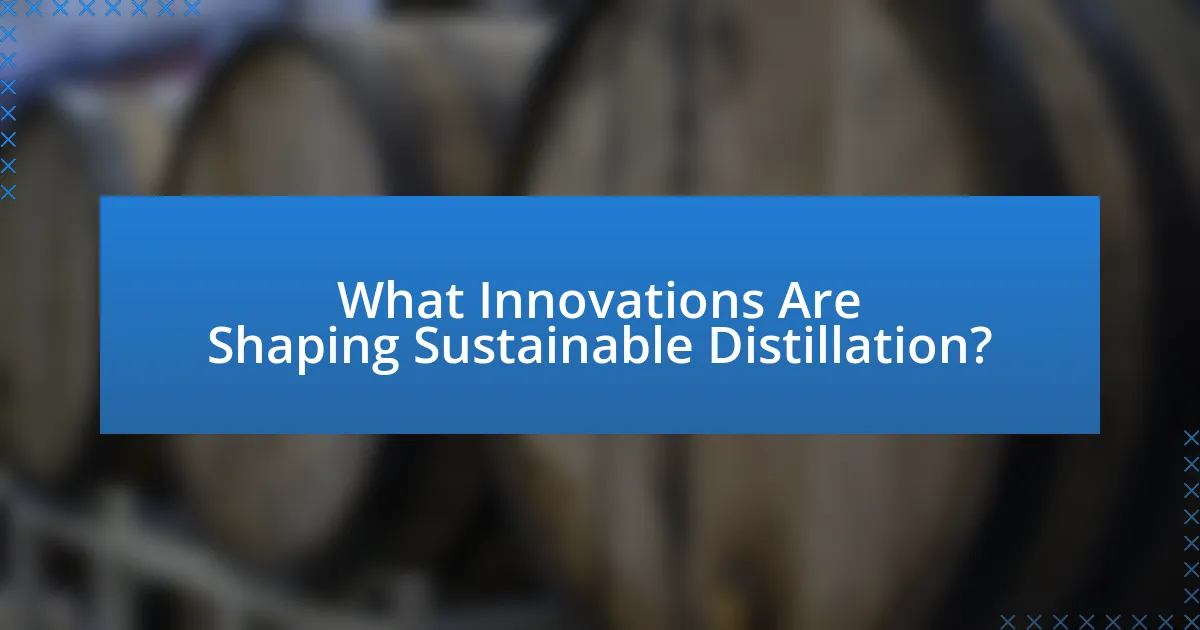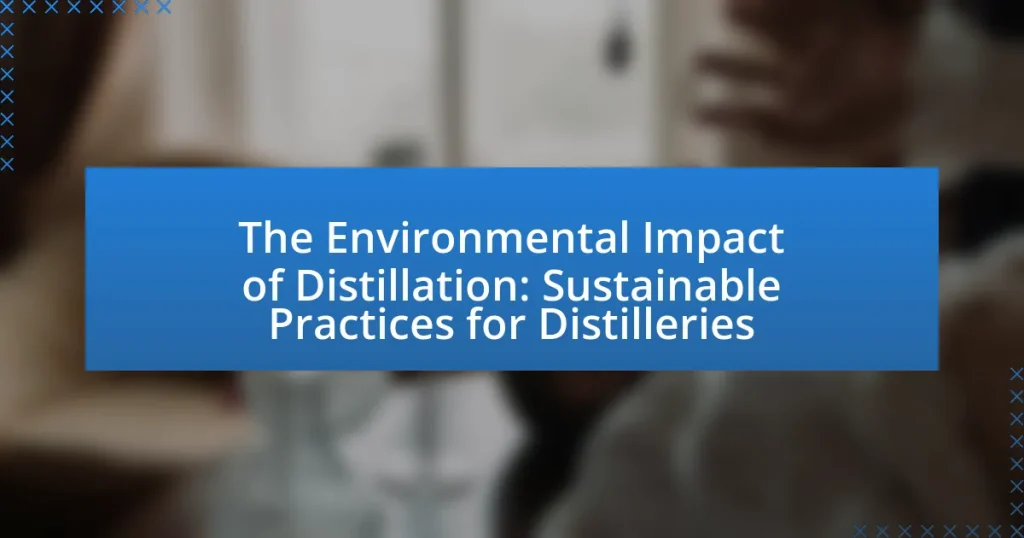The article examines the environmental impact of distillation, highlighting its significant energy consumption, water usage, and emissions of volatile organic compounds. It discusses the substantial carbon footprint associated with distillation processes, which account for a considerable percentage of energy use in chemical manufacturing. The article emphasizes the need for sustainable practices in distilleries, such as energy efficiency, waste reduction, and water conservation, to mitigate these environmental effects. Additionally, it explores innovations and technologies that can enhance sustainability in distillation, ultimately benefiting both the environment and the distillery’s operational efficiency.

What is the Environmental Impact of Distillation?
The environmental impact of distillation primarily includes high energy consumption, water usage, and potential emissions of volatile organic compounds. Distillation processes often require significant heat, leading to increased greenhouse gas emissions if fossil fuels are used. For example, a study by the International Energy Agency indicates that distillation accounts for approximately 30% of the energy used in chemical manufacturing, highlighting its substantial carbon footprint. Additionally, distillation can consume large volumes of water, which may strain local water resources, especially in arid regions. Furthermore, the release of volatile organic compounds during distillation can contribute to air pollution and health issues. These factors underscore the need for sustainable practices in distilleries to mitigate environmental impacts.
How does distillation affect the environment?
Distillation affects the environment primarily through energy consumption and emissions. The distillation process requires significant energy, often derived from fossil fuels, leading to greenhouse gas emissions. For instance, a study by the International Energy Agency indicates that distillation accounts for approximately 10-15% of the total energy consumption in chemical manufacturing, contributing to carbon dioxide emissions. Additionally, the process can generate waste products and effluents that may contaminate water sources if not properly managed. Therefore, the environmental impact of distillation is substantial, necessitating the adoption of sustainable practices to mitigate these effects.
What are the primary environmental concerns associated with distillation?
The primary environmental concerns associated with distillation include high energy consumption, water usage, and the generation of waste products. Distillation processes typically require significant amounts of energy, often derived from fossil fuels, contributing to greenhouse gas emissions. For instance, a study by the International Energy Agency indicates that distillation can account for up to 30% of the total energy consumption in chemical manufacturing. Additionally, distillation requires large volumes of water for both the process and cooling, which can strain local water resources, especially in arid regions. Furthermore, the distillation process can produce waste materials, including spent grains and other by-products, which may lead to pollution if not managed properly.
How does energy consumption in distillation impact the environment?
Energy consumption in distillation significantly impacts the environment by contributing to greenhouse gas emissions and increasing the carbon footprint of the distillation process. Distillation requires substantial energy, often derived from fossil fuels, which releases carbon dioxide and other pollutants into the atmosphere. For instance, a study published in the journal “Energy” indicates that distillation can account for up to 30% of the total energy consumption in chemical manufacturing, leading to considerable environmental degradation. Additionally, high energy use can result in thermal pollution, affecting local ecosystems and water bodies.
What are the byproducts of distillation and their environmental effects?
The byproducts of distillation primarily include volatile organic compounds (VOCs), wastewater, and residual solids. VOCs can contribute to air pollution and respiratory issues, while wastewater may contain harmful chemicals that can contaminate water sources if not treated properly. Residual solids, often rich in organic material, can lead to soil degradation and attract pests if disposed of improperly. These environmental effects highlight the need for sustainable practices in distilleries to mitigate pollution and promote responsible waste management.
What types of waste are generated during the distillation process?
During the distillation process, several types of waste are generated, including spent grains, stillage, and volatile organic compounds (VOCs). Spent grains are the solid residues left after the extraction of alcohol from fermented materials, while stillage refers to the liquid byproduct that contains water, residual sugars, and other compounds. VOCs are gases emitted during the heating and evaporation phases, which can contribute to air pollution. These waste types highlight the environmental challenges associated with distillation, necessitating sustainable practices to mitigate their impact.
How do these byproducts affect local ecosystems?
Byproducts from distillation can significantly disrupt local ecosystems by introducing pollutants and altering soil and water quality. These byproducts often contain organic compounds and heavy metals that can leach into the surrounding environment, leading to toxic conditions for flora and fauna. For instance, studies have shown that wastewater from distilleries can increase nutrient levels in nearby water bodies, resulting in harmful algal blooms that deplete oxygen and harm aquatic life. Additionally, the accumulation of these byproducts in soil can affect plant growth and biodiversity, as certain species may be more sensitive to the contaminants present.

What Sustainable Practices Can Distilleries Implement?
Distilleries can implement several sustainable practices, including water conservation, energy efficiency, waste reduction, and sourcing local ingredients. Water conservation can be achieved through closed-loop systems that recycle water used in production, significantly reducing overall consumption. Energy efficiency can be enhanced by utilizing renewable energy sources, such as solar or wind power, which can lower carbon emissions and operational costs. Waste reduction practices, such as composting spent grains and using by-products for animal feed, can minimize landfill contributions. Additionally, sourcing local ingredients supports regional agriculture and reduces transportation emissions, contributing to a smaller carbon footprint. These practices not only promote environmental sustainability but also align with consumer preferences for eco-friendly products.
How can distilleries reduce their carbon footprint?
Distilleries can reduce their carbon footprint by implementing energy-efficient technologies and utilizing renewable energy sources. For instance, transitioning to solar or wind energy can significantly lower greenhouse gas emissions associated with production. Additionally, optimizing distillation processes through heat recovery systems can enhance energy efficiency, reducing the overall energy consumption by up to 30%. Furthermore, sourcing raw materials locally minimizes transportation emissions, contributing to a lower carbon footprint. These practices not only decrease environmental impact but also align with growing consumer demand for sustainable products.
What renewable energy sources can be utilized in distillation?
Solar energy, wind energy, and biomass are renewable energy sources that can be utilized in distillation. Solar energy can be harnessed through solar thermal systems to provide heat for the distillation process, while wind energy can be converted into electricity to power distillation equipment. Biomass, such as agricultural waste, can be used as a fuel source for heating during distillation. These renewable sources contribute to reducing the carbon footprint of distillation processes, aligning with sustainable practices in distilleries.
How can energy efficiency be improved in distillation processes?
Energy efficiency in distillation processes can be improved by implementing advanced technologies such as heat integration, which recycles heat within the system, and using more efficient distillation columns like packed columns that require less energy. For instance, studies have shown that integrating heat exchangers can reduce energy consumption by up to 30% in certain distillation setups. Additionally, optimizing operational parameters, such as reflux ratios and feed temperatures, can further enhance energy efficiency. These methods not only lower energy costs but also reduce the overall environmental impact of distillation processes.
What waste management strategies are effective for distilleries?
Effective waste management strategies for distilleries include recycling spent grains, implementing anaerobic digestion for organic waste, and utilizing wastewater treatment systems. Recycling spent grains not only reduces landfill waste but also provides a valuable resource for animal feed, thereby promoting a circular economy. Anaerobic digestion converts organic waste into biogas, which can be used for energy production, thus minimizing greenhouse gas emissions. Additionally, advanced wastewater treatment systems can significantly reduce the environmental impact of effluents, ensuring compliance with environmental regulations and protecting local water sources. These strategies collectively enhance sustainability and reduce the ecological footprint of distilleries.
How can distilleries minimize liquid waste?
Distilleries can minimize liquid waste by implementing efficient distillation processes and recycling byproducts. Efficient distillation techniques, such as using continuous column stills, reduce the amount of liquid lost during the distillation process. Additionally, distilleries can repurpose byproducts like spent grains and yeast, which can be used in animal feed or as fertilizers, thus minimizing overall waste. According to a study by the Distilled Spirits Council, adopting these practices can lead to a reduction of up to 30% in liquid waste, demonstrating their effectiveness in promoting sustainability within the industry.
What recycling practices can be adopted in distillation operations?
Recycling practices that can be adopted in distillation operations include the recovery and reuse of solvents, the recycling of heat through heat exchangers, and the repurposing of by-products. The recovery of solvents minimizes waste and reduces the need for new materials, while heat exchangers can capture and reuse thermal energy, improving energy efficiency. Additionally, by-products from distillation, such as spent grains or residual oils, can be repurposed for animal feed or biofuel production, thereby reducing overall waste and enhancing sustainability in distillation processes. These practices contribute to a circular economy, aligning with environmental sustainability goals in the distillation industry.

What Innovations Are Shaping Sustainable Distillation?
Innovations shaping sustainable distillation include the use of renewable energy sources, advanced distillation technologies, and waste valorization techniques. Renewable energy, such as solar and wind power, reduces the carbon footprint of distillation processes. Advanced technologies like membrane distillation and vacuum distillation enhance energy efficiency and minimize water usage. Waste valorization techniques, which convert by-products into valuable resources, further contribute to sustainability by reducing waste and promoting circular economy practices. These innovations collectively lead to a more environmentally friendly distillation process, aligning with global sustainability goals.
How is technology advancing sustainable practices in distillation?
Technology is advancing sustainable practices in distillation through innovations such as energy-efficient distillation equipment, real-time monitoring systems, and the integration of renewable energy sources. Energy-efficient distillation equipment, like column stills with advanced heat recovery systems, reduces energy consumption by up to 30%, significantly lowering the carbon footprint of the distillation process. Real-time monitoring systems enable distilleries to optimize their operations, minimizing waste and improving resource management. Additionally, the use of renewable energy sources, such as solar or wind power, further decreases reliance on fossil fuels, promoting a more sustainable production cycle. These technological advancements collectively contribute to reducing environmental impact while enhancing the efficiency and sustainability of distillation practices.
What role do automation and monitoring systems play in sustainability?
Automation and monitoring systems significantly enhance sustainability by optimizing resource use and minimizing waste in distilleries. These systems enable real-time data collection and analysis, allowing distilleries to monitor energy consumption, water usage, and emissions closely. For instance, automated controls can adjust processes to reduce energy consumption by up to 30%, as reported in studies on industrial efficiency. Furthermore, monitoring systems facilitate compliance with environmental regulations by providing accurate reporting on emissions and waste management, thereby promoting sustainable practices.
How can data analytics improve resource management in distilleries?
Data analytics can significantly improve resource management in distilleries by optimizing production processes and reducing waste. By analyzing data from various stages of production, distilleries can identify inefficiencies, such as excessive energy consumption or raw material usage. For instance, a study by the American Distilling Institute found that implementing data analytics led to a 15% reduction in water usage and a 10% decrease in energy costs for participating distilleries. This data-driven approach enables distilleries to make informed decisions that enhance sustainability and operational efficiency.
What are the benefits of adopting sustainable practices in distillation?
Adopting sustainable practices in distillation significantly reduces environmental impact and enhances operational efficiency. Sustainable distillation methods, such as energy recovery systems and water recycling, lower energy consumption and minimize waste generation. For instance, implementing heat exchangers can reduce energy use by up to 30%, while water conservation techniques can decrease water usage by 50%. These practices not only contribute to environmental preservation but also lead to cost savings and improved product quality, making distilleries more competitive in the market.
How do sustainable practices enhance brand reputation for distilleries?
Sustainable practices enhance brand reputation for distilleries by demonstrating a commitment to environmental stewardship and social responsibility. When distilleries implement eco-friendly methods, such as using renewable energy sources, reducing water consumption, and minimizing waste, they attract environmentally conscious consumers who prefer brands that align with their values. Research indicates that 66% of consumers are willing to pay more for sustainable brands, which reinforces the positive perception of distilleries that prioritize sustainability. Additionally, transparency in sourcing ingredients and production processes builds trust and loyalty among customers, further solidifying the brand’s reputation in a competitive market.
What economic advantages can distilleries gain from sustainability?
Distilleries can gain significant economic advantages from sustainability by reducing operational costs and enhancing brand value. Implementing sustainable practices, such as energy efficiency measures and waste reduction strategies, can lead to lower utility bills and decreased raw material expenses. For instance, a study by the Distilled Spirits Council found that distilleries adopting energy-efficient technologies can save up to 30% on energy costs. Additionally, sustainability initiatives can attract environmentally conscious consumers, thereby increasing market share and allowing for premium pricing. Research indicates that brands perceived as sustainable can command a 20% price premium, further boosting profitability.
What practical steps can distilleries take to implement sustainability?
Distilleries can implement sustainability by adopting energy-efficient technologies, such as using renewable energy sources like solar or wind power. This transition reduces greenhouse gas emissions and lowers operational costs. Additionally, distilleries can optimize water usage through recycling and treatment systems, which minimizes water waste and conserves local water resources. Implementing sustainable sourcing practices for raw materials, such as using locally grown grains, also supports local economies and reduces transportation emissions. Furthermore, distilleries can engage in waste reduction strategies, including composting organic waste and repurposing by-products, which contributes to a circular economy. These steps collectively enhance the environmental sustainability of distillation processes.


